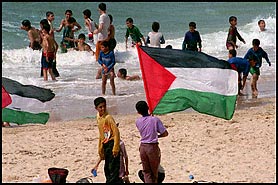Gaza Strip
coastal
pollution takes
health toll,
INWEH
study finds
 |
|
Children fly Palenstinian flags on a Gaza City beach |
At three of 12 coastal sites sampled over six weeks, researchers found levels of pollution such as fecal coliform and fecal streptococci well in excess of U.S. EPA standards. The worst seawater pollution was found in the central part of the Gaza Strip, where effluent from Gaza City is discharged. Rainfall and tides were major factors affecting water quality in the winter season.
The study included a survey showing that people in their teens and early 20s were the largest users of Gaza’s coastal recreation areas, a stretch of the Mediterranean covering about 74 square km. Almost all (93 of 100 respondents) entered the water to swim and more than half (55) reported problems ranging from skin irritation and headaches to respiratory and intestinal sicknesses.
Conducted by INWEH in co-operation with the Islamic University of Gaza and the Palestinian Ministry of Environment, and funded by the Arab Gulf Fund for UN Development (AGFUND) and the Government of Norway, the study showed males were roughly seven times more likely to be aware of the contamination sites.
Only one-third of more than one million people living in the Gaza Strip are serviced by wastewater treatment facilities. The study also noted that pollution is exacerbated by the lack of appropriate local industrial zones, the proliferation of unlicensed and unregulated stone quarries, and urban planning without regard for environmental quality.
The study calls for a permanent monitoring program, upgraded wastewater treatment plants, a public awareness program including development of guidelines for bathing water and beach quality, strict controls on fishing, and further study of the health impact, especially among children, of contaminated sands.
For more information, contact UNU/INWEH.